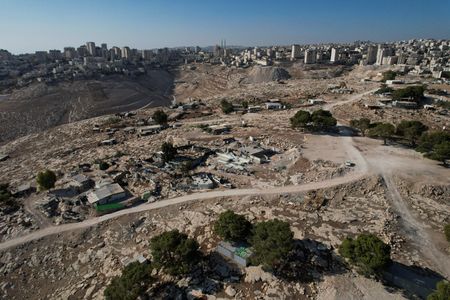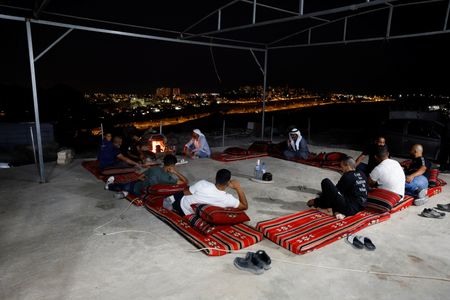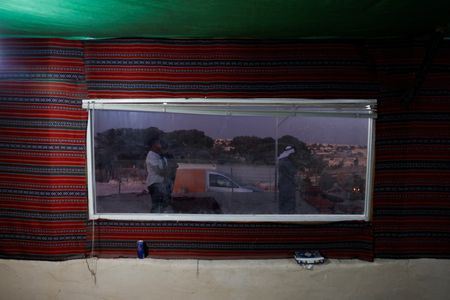By Pesha Magid
JABAL Al-BABA, West Bank (Reuters) -The land available to Atallah al-Jahalin’s Bedouin community for grazing livestock near Jerusalem has steadily shrunk, as expanding Jewish settlements on Israeli-occupied territory encircle the city and push deeper into the West Bank.
Now, the group of some 80 families faces eviction from the last patches of valley and scrubland they have called home for decades.
Their predicament is tied to an Israeli settlement project that would slice through the West Bank, sever its connection to East Jerusalem, and -- according to Israeli officials -- "bury" any remaining hope of a future Palestinian state.
As more Western powers move to recognise a Palestinian state amid frustration over the war in Gaza, Palestinians around Jerusalem say they are watching their land vanish under the advance of Israeli cranes and bulldozers. Settlements now form an almost unbroken ring around the city.
“Where else could I go? There is nothing,” said Jahalin, seated beneath a towering cedar tree near Maale Adumim, a settlement that has already grown into a Jewish suburb of Jerusalem on Israeli-occupied Palestinian land.
The so-called E1 project, recently greenlit by Prime Minister Benjamin Netanyahu’s government, will fill the last major gap in the settlement belt -- an area that, until now, had remained untouched by construction.
"This actually cuts the possibility of a viable Palestinian state," said Hagit Ofran, of Peace Now, an Israeli anti-settlement group. "The territorial continuity from North to South is going to be totally cut."
Israel previously froze construction plans at Maale Adumim in 2012 and again in 2020, following objections from the U.S., European allies and other powers who viewed the project as a threat to any future peace deal with the Palestinians.
But in August, Netanyahu and far-right Finance Minister Bezalel Smotrich announced that work would begin. Smotrich declared the move would “bury” the idea of a Palestinian state.
"Whoever in the world is trying to recognise a Palestinian state today will receive our answer on the ground," Smotrich said. "Not with documents nor with decisions or statements, but with facts. Facts of houses, facts of neighbourhoods."
SETTLEMENT GROWTH DEFIES DIPLOMATIC PRESSURE
The move was condemned by Australia, Britain, Canada, the European Union and Japan as a breach of international law.
Palestinian presidential spokesperson Nabil Abu Rudeinah condemned the announcement, calling it a violation of international law.
The offices of Netanyahu and Smotrich did not immediately respond to a Reuters request for comment.
Reflecting growing criticism of the Gaza war -- which has devastated much of the enclave on Israel’s southern border -- Australia, Britain, Canada and Portugal recognised a Palestinian state on Sunday, joining about 140 other countries that have already done so.
But the timing highlights a stark contrast between diplomatic gestures and the reality on the ground, where Israeli settlements continue to expand rapidly across the occupied West Bank.
Most world powers consider all the settlements illegal under international law, although Israel says it has historical and biblical ties to the area that it calls Judea and Samaria.
A U.N. report says Israel has significantly expanded settlements in the West Bank in breach of international law.
Today, about 700,000 Israeli settlers live among 3.4 million Palestinians in the West Bank and East Jerusalem, according to the Palestinian Central Bureau of Statistics.
Last month, Jahalin's community was served demolition orders for their homes and told they had 60 days to tear them down themselves. Israeli security forces accompanied by dogs have repeatedly raided their homes at night, acts the community views as intimidation.
"When a child wakes up and sees a dog in his face, he gets frightened, it's a disaster," said Mohammed al-Jahalin, Atallah's brother.
Mohammed al-Jahalin said they used to challenge the demolition notices in court, but since the Gaza war, "if you reach out to the court it will give you an immediate evacuation order."
Part of the E1 project includes the so-called "Fabric of Life Road," which would create separate roads for Israelis and Palestinians, cutting off Palestinian access to large swathes of the West Bank. The road would also sever a vital link between Bedouin communities -- like the 22 families living in Jabal Al-Baba -- and the nearby Palestinian village of al-Eizariya.
BEDOUIN FEAR A NEW CYCLE OF DISPOSSESSION
As children, the Jahalin brothers walked down the stony hill to attend school in the bustling town below, and their grandchildren follow the same path today.
"We are dependent on al-Eizariya for education as the children go to school there, for health, for everything, our economic situation is also tied to al-Eizariya," said Atallah.
A few hills over across a highway, the settlement of Maale Adumim is poised to expand under the E1 plan.
"I do feel for the Palestinians," said Shelly Brinne, a settler living in Maale Adumim, citing their struggles with checkpoints and limited work opportunities. "But unfortunately as an Israeli citizen I feel like I have to worry about my security first."
A spokesperson for the Maale Adumim settlement did not immediately respond to a request for comment.
The Bedouin community came to Jabal Al-Baba after what Palestinians call the "Nakba" or catastrophe, when hundreds of thousands were dispossessed in the war at the birth of the state of Israel.
"Our forefathers lived the Nakba, and today, we go through all the struggle, which we wish our children do not have to go through," said Atallah, who is the leader of the community.
In the evening one of the men made coffee over an open flame while the rest of the community lounged on cushions and traded jokes as the sun dipped behind the hills.
Across the highway, the lights of Maale Adumim’s white high-rises glittered.
“There is no place for us to go," said Mohammed, sipping his coffee. "To leave the land that we were born in, and so were our fathers and forefathers, if we have to leave it, it would be like dying."
(Reporting by Pesha Magid, Additional reporting by Hannah Confino, Editing by William Maclean)












